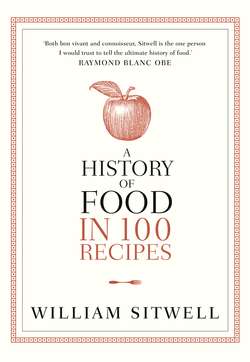Читать книгу A History of Food in 100 Recipes - William Sitwell - Страница 33
Оглавление26
Earth apples
(Potatoes fried and simmered with bacon bits)
1581
AUTHOR: Marx Rumpolt, FROM: Ein new Kochbuch (A New Cookbook)
Peel and cut them small, simmer them in water and press it well out through a fine cloth; chop them small and fry them in bacon that is cut small; take a little milk there under and let it simmer therewith so it is good and well tasting.
The history of the potato rarely relates the role played by the German archbishop of Mainz, Daniel Brendel von Homburg. In the latter part of the sixteenth century, he was selected for the senior role of elector in the Holy Roman Empire of the German nation. It was a time of religious and political shenanigans (when isn’t it?) and he worked hard to keep the peace between the Lutherans (thought by many to be obstinate heretics who followed the strict Protestantism of Martin Luther) and the Catholic princes.
How did he keep the peace? Well, given that he had a seriously good chef in his kitchen, it’s likely that he entertained them to dinner. And what kind of dishes did he present? A whole manner of fabulous treats – from roasts, pastries, pies and soups to tortes and salads. There was simple fare – stewed pears and tasty plates of fava beans fried with bacon – but there were exotic dishes too, using ingredients never seen before in Germany or more widely in Europe. In particular there was a dish of ‘earth apples’, what we today call potatoes, but the Germans still call earth apples (Erdäpfel), as of course do the French (pommes de terre) and other nations.
The cook was one Marx Rumpolt and this and around 2,000 other recipes appear in his 1581 Ein new Kochbuch, or ‘A New Cookbook’. Rumpolt produced feasts and banquets for his master as he went about his political and religious business. So prolific was his cooking that he wrote his recipes down, publishing them with the specific aim of helping and encouraging young cooks.
Before landing a job with the Elector of Mainz, Rumpolt had worked for a variety of European nobles, learning the cuisines of different regions. He was proud of his knowledge, making it clear in his introduction that these were his own recipes. He had not purloined them from others cooks as many others had, did and indeed would. His cookbook also includes descriptions of wine-making and 150 woodcut illustrations.
His recipe for a potato dish is historic in being the earliest surviving recipe using potatoes. In addition, it demonstrates a good understanding of how to cook the vegetable: Rumpolt simmers his potatoes, before straining and drying them and then, after cutting them into smaller pieces, fries them with bacon and adds a little milk. However delicious the dish was, though, for the princes and religious types who were lucky enough to eat it, perhaps it was ahead of its time for it took another 150 years for the potato to find favour in Europe, although it had been popular for centuries in North and South America, where it had grown as a wild perennial in the mountains.
It was discovered, as were so many exotic ingredients, by the sixteenth-century conquistadors, its arrival in Europe much mythologised by historians and others. Was it Pedro de León, who came across them in Peru in 1553, or Jiménez de Quesada in Colombia in 1537? Possibly both. The latter apparently came upon a village whose inhabitants had vanished – unsurprisingly given the Spaniards’ reputation for slaughtering people. There he found maize, beans and what he described as ‘truffles’. They were a delicacy to the Indians, with good flavour. The Italians called them truffles because they were small, misshapen and knobbly, which sound a bit like the Pink Fir Apple variety of potato.
These tartuffli – earth truffles – were then brought back to Europe. Some say they arrived in England in the 1580s with the mathematician Thomas Harriot who had accompanied Sir Walter Raleigh. Raleigh himself is supposed to have planted some in his estate garden at Killulagh in Ireland. Unconvinced by them, he got his gardener to dig them up, whereupon the man discovered large quantities of tubers.
Yet, again, they were slow to take off. The French turned their nose up at them, convinced they were responsible for leprosy. Scottish Protestants disapproved of them strongly because they weren’t mentioned in the Bible. Then when cultivation of potatoes eventually did spread, it seemed more for the benefit of cattle than of people, until the authorities discovered they made good food for the poor. In 1663 a member of the Royal Society, a gent from Somerset, was encouraging the growing of potatoes across the country, but the 1719 edition of The Complete Gardener still completely ignored them, while a sister publication described the potato as inferior to the radish.
